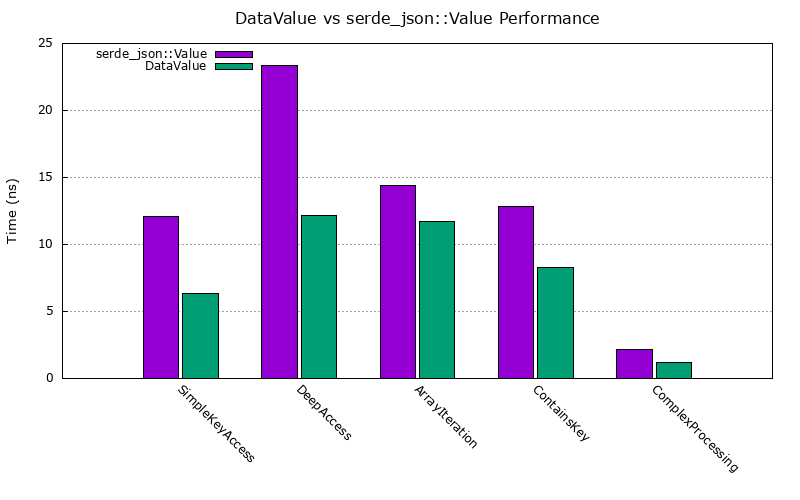4 releases
| 0.1.5 | Apr 19, 2025 |
|---|---|
| 0.1.4 | Apr 18, 2025 |
| 0.1.3 | Apr 18, 2025 |
| 0.1.1 | Apr 18, 2025 |
#591 in Parser implementations
448 downloads per month
105KB
1K
SLoC
datavalue-rs
Introduction
datavalue-rs is a Rust library that provides a highly performant, memory-efficient data structure for working with parsed JSON data. It serves as a drop-in replacement for serde_json::Value, maintaining API compatibility while optimizing for speed and memory efficiency through arena-based allocation.
The library can be used with any JSON parser by implementing appropriate conversion functions, allowing flexibility in choosing parsing strategies while benefiting from the efficient data representation.
Motivation
While serde_json::Value provides an excellent API, it can face performance challenges in high-throughput scenarios due to frequent heap allocations, pointer chasing, and memory fragmentation. datavalue-rs aims to:
- Maintain API Compatibility: Serve as a direct drop-in replacement for
serde_json::Value - Improve Performance: Reduce overhead through arena-based allocation and optimized memory layout
- Reduce Memory Usage: Minimize fragmentation and allocations while keeping the same interface
Performance
DataValue significantly outperforms serde_json::Value for many common operations, particularly those involving deep access and complex traversals.
For detailed benchmarks and analysis, see scripts/summary.md.

Core Functionality
Value Types
Like serde_json::Value, datavalue-rs supports all standard JSON data types:
- Null
- Boolean
- Number (Integer and Floating-point)
- String
- Array
- Object (Key-Value pairs)
Performance Enhancements
While maintaining the same API, datavalue-rs uses:
- Arena Allocation: Values are allocated in contiguous memory regions, improving cache locality
- Slices instead of Vectors: Using slice references to arena-allocated memory reduces indirection
- Zero-Copy String Handling: Strings are stored directly in the arena, reducing copies
Public API
Core Value Type
pub enum DataValue<'a> {
Null,
Bool(bool),
Number(Number),
String(&'a str),
Array(&'a [DataValue<'a>]),
Object(&'a [(&'a str, DataValue<'a>)]),
}
pub enum Number {
Integer(i64),
Float(f64),
}
Type Checking
impl<'a> DataValue<'a> {
pub fn is_null(&self) -> bool;
pub fn is_bool(&self) -> bool;
pub fn is_number(&self) -> bool;
pub fn is_string(&self) -> bool;
pub fn is_array(&self) -> bool;
pub fn is_object(&self) -> bool;
}
Value Accessors
impl<'a> DataValue<'a> {
pub fn as_bool(&self) -> Option<bool>;
pub fn as_i64(&self) -> Option<i64>;
pub fn as_f64(&self) -> Option<f64>;
pub fn as_str(&self) -> Option<&'a str>;
pub fn as_array(&self) -> Option<&[DataValue<'a>]>;
pub fn as_object(&self) -> Option<&[(&'a str, DataValue<'a>)]>;
}
Indexing
impl<'a> std::ops::Index<&str> for DataValue<'a> {
type Output = DataValue<'a>;
fn index(&self, key: &str) -> &Self::Output;
}
impl<'a> std::ops::Index<usize> for DataValue<'a> {
type Output = DataValue<'a>;
fn index(&self, index: usize) -> &Self::Output;
}
JSON Pointer
impl<'a> DataValue<'a> {
pub fn pointer(&self, pointer: &str) -> Option<&Self>;
}
Serialization
impl<'a> DataValue<'a> {
pub fn to_string(&self) -> String;
}
// Module-level functions
pub fn to_string<'a>(value: &DataValue<'a>) -> String;
pub fn to_string_pretty<'a>(value: &DataValue<'a>) -> String;
Deserialization
impl<'a> DataValue<'a> {
pub fn from_str(arena: &'a Bump, s: &str) -> Result<Self>;
pub fn from_slice(arena: &'a Bump, v: &[u8]) -> Result<Self>;
pub fn from_reader<R: Read>(arena: &'a Bump, reader: R) -> Result<Self>;
}
// Module-level function
pub fn from_str<'a>(arena: &'a Bump, s: &str) -> Result<DataValue<'a>>;
Conversion Traits
// From implementations for common types
impl<'a> From<bool> for DataValue<'a>;
impl<'a> From<i64> for DataValue<'a>;
impl<'a> From<f64> for DataValue<'a>;
// ... other numeric types ...
// Integration with serde
impl<'a> Serialize for DataValue<'a>;
impl<'de, 'a> Deserialize<'de> for DataValue<'a> where 'de: 'a;
Implementation Notes
Key Differences from serde_json::Value
-
Arena Parameter
- Methods that create or parse values require an arena parameter:
let arena = Bump::new(); let value = DataValue::from_str(&arena, r#"{"key": "value"}"#)?; -
Immutability
- Due to the arena-based design, DataValue is primarily designed for immutable access
- Mutating operations require creating new values in the arena
-
Lifetime Management
- Values maintain references to the arena, requiring appropriate lifetime management
- The DataValue cannot outlive the arena that created it
-
Parser Integration
- Easily integrate with any JSON parser by implementing conversion functions
- Create custom adapters for specific parsers or data formats while maintaining the efficient arena-based structure
Examples
Basic Usage
use datavalue_rs::{DataValue, Bump};
let arena = Bump::new();
// Parse JSON
let json_str = r#"{"name": "John", "age": 30, "hobbies": ["reading", "coding"]}"#;
let person = DataValue::from_str(&arena, json_str)?;
// Access values
println!("Name: {}", person["name"].as_str().unwrap());
println!("Age: {}", person["age"].as_i64().unwrap());
println!("First hobby: {}", person["hobbies"][0].as_str().unwrap());
// Serialize
let json_string = person.to_string();
Working with Arrays and Objects
use datavalue_rs::{DataValue, Bump};
let arena = Bump::new();
// Create values
let name = DataValue::new_string(&arena, "Jane");
let age = DataValue::new_number_integer(25);
let hobbies = DataValue::new_array(&arena, vec![
DataValue::new_string(&arena, "swimming"),
DataValue::new_string(&arena, "painting"),
]);
// Create object
let person = DataValue::new_object(&arena, vec![
(arena.alloc_str("name"), name),
(arena.alloc_str("age"), age),
(arena.alloc_str("hobbies"), hobbies),
]);
// Serialize to JSON
let json = person.to_string();
println!("{}", json);
Integration with Custom Parsers
use datavalue_rs::{DataValue, Bump};
use custom_json_parser::Parser;
// Example function to convert from a custom parser's output
fn from_custom_parser<'a>(arena: &'a Bump, parsed_json: &Parser::Value) -> DataValue<'a> {
match parsed_json {
Parser::Value::Null => DataValue::Null,
Parser::Value::Bool(b) => DataValue::Bool(*b),
Parser::Value::Number(n) => {
if n.is_integer() {
DataValue::Number(Number::Integer(n.as_i64().unwrap()))
} else {
DataValue::Number(Number::Float(n.as_f64().unwrap()))
}
},
Parser::Value::String(s) => DataValue::String(arena.alloc_str(s)),
// Handle arrays and objects similarly
// ...
}
}
// Using the conversion function
let arena = Bump::new();
let custom_parsed = Parser::parse(json_string);
let data_value = from_custom_parser(&arena, &custom_parsed);
Running Benchmarks
To run the benchmarks and see the performance comparison:
cargo bench
For a detailed analysis and summary:
./scripts/run_benchmarks.sh
Dependencies
~1.7–3MB
~53K SLoC